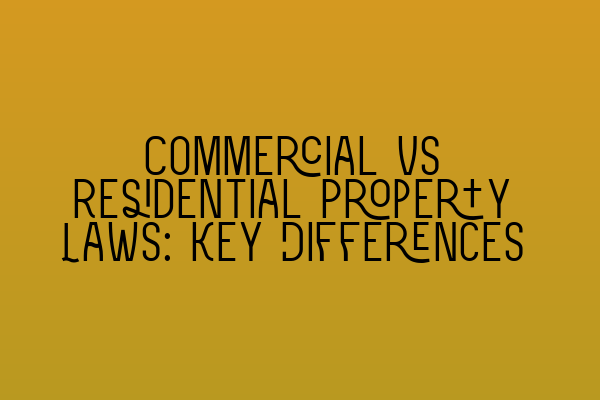Commercial vs Residential Property Laws: Key Differences
As a solicitor specializing in property law at SQE Property Law & Land Law, it is crucial to understand the key differences between commercial and residential property laws. Whether you are a property investor, landlord, or tenant, knowledge of these differences is essential to navigate the legal complexities that come with owning or leasing property. In this blog post, we will explore the significant distinctions between commercial and residential property laws, providing you with valuable insights into each sector.
Commercial Property Laws
Commercial property laws primarily govern the buying, selling, leasing, and development of properties intended for business purposes. These properties include office buildings, retail spaces, industrial sites, and warehouses. The main differences between commercial and residential property laws are:
1. Lease Terms: Commercial leases typically have longer terms than residential leases. While residential leases are commonly set for a year or less, commercial leases can span several years, offering stability for both tenants and landlords. It is crucial to understand the intricacies of commercial lease agreements to ensure fair treatment and protect your rights as a business owner or landlord.
2. Rent Payment: Commercial rent structures differ from residential rent payment methods. Commercial rents are generally higher and calculated based on factors such as square footage, location, market demand, and the tenant’s intended use of the property. In contrast, residential rents are typically fixed and do not vary significantly based on these factors.
3. Property Use and Zoning Regulations: Commercial properties are subject to more stringent use and zoning regulations compared to residential properties. These regulations are in place to ensure proper alignment with the local area’s overall development plan and protect the interests of surrounding businesses and residents. It is necessary to comply with these regulations to avoid potential legal issues and penalties.
4. Repair and Maintenance Responsibility: Unlike residential properties, where landlords are often responsible for maintaining the property’s overall condition, commercial leases usually place the burden of repair and maintenance on the tenant. It is vital for tenants to carefully review lease agreements to understand their obligations and negotiate favorable terms when possible.
5. Dispute Resolution: Commercial property disputes are typically resolved through negotiation, mediation, or arbitration, whereas residential property disagreements often involve specialized housing courts. Understanding the alternative dispute resolution methods common in commercial property law can help expedite the resolution process while minimizing costs and maintaining business relationships.
Residential Property Laws
In contrast, residential property laws apply to properties used primarily for housing purposes, such as single-family homes, apartments, and condominiums. When dealing with residential properties, it is important to be aware of the following key distinctions:
1. Tenancy Rights: Residential tenants benefit from various legal protections, including the right to a habitable living environment, protection against unlawful eviction, and the ability to seek remedies for landlord negligence. Understanding these rights is crucial for both tenants and landlords to ensure a fair and transparent rental relationship.
2. Security Deposits: Residential landlords often require tenants to pay a security deposit that can be used to cover any damage caused during the tenancy. Laws regulate the amount that can be charged, the conditions for withholding the deposit, and the timeline for returning it at the end of the tenancy. Compliance with these laws is essential to avoid legal complications.
3. Eviction Procedures: The eviction process for residential properties is highly regulated, aiming to protect tenants’ rights and prevent unlawful evictions. Landlords must follow specific procedures, including providing proper notice and filing legal documents with the appropriate court. Any deviation from these procedures can result in the eviction being deemed illegal.
4. Rent Control and Tenant Protection: In certain jurisdictions, residential properties may be subject to rent control regulations or additional tenant protection laws. These laws limit rent increases, restrict eviction grounds, and provide further rights to tenants. Understanding the applicable regulations in your area is crucial for both landlords and tenants alike.
Conclusion
Understanding the key differences between commercial and residential property laws is vital for anyone involved in the property market. Whether you are a business owner seeking a commercial space or a homeowner looking to lease your property, comprehensive knowledge of the legal intricacies will help you navigate potential pitfalls and ensure compliance with relevant laws.
At SQE Property Law & Land Law, we offer comprehensive legal services tailored to your specific needs, whether you require assistance with commercial or residential property matters. Our team of experienced solicitors can guide you through the intricacies of property law, helping you protect your rights and make informed decisions.
To further enhance your understanding of property law, we also offer SQE 1 and SQE 2 preparation courses. Our expertly designed courses will equip you with the knowledge and skills needed to excel in the Solicitors Qualifying Examination (SQE) and embark on a successful career in law.
For more information about our courses, practice exams, and other resources, visit our website:
– SQE 1 Practice Exam Questions
– SQE 1 Practice Mocks FLK1 FLK2
– SQE 2 Preparation Courses
– SQE 1 Preparation Courses
– SRA SQE Exam Dates
Contact SQE Property Law & Land Law today to discuss your property law needs and take the first step towards achieving your goals in the property industry.
